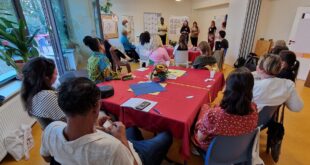A poll by Oxfam Intermon said over 60 percent of Spaniards interviewed were in favour of migration while 20 percent thought they were being ”invaded” by migrants. Paola Del Vecchio reports.
A survey released by Oxfam Intermon to mark World Refugee Day on Wednesday said 65 percent of Spaniards interviewed wanted to welcome refugees and migrants and 21 percent of those surveyed felt they were being ”invaded” by migrants.
The poll also said that seven in 10 citizens believe refugees should be rescued urgently if they are in danger. In addition, 87 percent of those interviewed said they believe European governments could adopt measures regarding this issue and 85 percent that they should do more.
However, the survey highlighted that the majority of those polled (64 percent) thought the final objective needed to be for refugees to return to their home country.
Survey carried out before the Aquarius case
Interviews for the poll were carried out before the Italian government’s decision not to allow migrant-rescue vessel Aquarius to offload 630 migrants at an Italian port. The migrants were subsequently diverted to Valencia, Spain and the survey noted that ”Spanish citizens are supportive and want to help”, said Eva Garzon, who is in charge of global migrations for the NGO, presenting the report. ”This justifies a more courageous migration policy that places refugees and migrants at the centre”, she added.

However, 55 percent of those polled said they feared that terrorists could be infiltrated among the migrants arriving in the country. And eight in 10 expressed concern for raising racism and xenophobia.
Fewer refugees welcomed than 2015 quota
The report recalled that member States at a European Council meeting on July 2015 pledged to welcome within the following two years 20,000 people who had the right to international protection to respond to the refugee crisis in Syria.
Spain pledged to host 1,449 asylum-seekers but had welcomed only 631 people by June 2017, or 43 percent of the total. ”The interior ministry’s data indicated that, as of April 2018, 1,433 petitions were accepted” out of the 9,323 which Madrid had pledged to accept over the entire period, or 13 percent of the total, according to the dossier.
Oxfam therefore asked Socialist Premier Pedro Sanchez to mobilize other member States at the upcoming European Council meeting on 28-29 June in order for them to share the responsibility to protect the human rights of all the people who reach the continent to search for a better, safer life.
”The government must promote a turning point in current policies to externalize EU borders that are placing thousands of refugees at risk in third countries”, said José Maria Vera, director general of Oxfam Intermon.
No to agreements with countries that don’t guarantee rights
The NGO issued a series of recommendations, including taking into account the specific needs of little girls and women in global migration policies, selecting legal and safe pathways for migrants, increasing aid and employment for development, effectively implementing the Arms trade treaty. It also urged Sanchez to reject migration agreements with third countries that are not based on the ”scrupulous” implementation of human rights and international laws, like the EU-Turkey deal.
José Maria Vera also expressed the wish that the presence of Spain in the UN Human Rights Council until 2020 can be useful to promote humanitarian policies in the management of migration flows.
”Spain needs to contribute especially so that the international community can adopt policies for the protection of women and their rights, given that women and little girls make up for 50 percent of the refugee population in internal displacements caused by conflicts”, said the secretary general of Oxfam Intermon.
The survey was carried out on a sample of 803 people, including 51 percent women aged 18 to 70 from all social groups, 92 percent of whom had Spanish citizenship.
Six out of 10 people interviewed said they someone in their family or among friends had been forced to emigrate to find work. The majority (60 percent) called ”friends” the migrants they knew directly or indirectly through acquaintances while only 2 percent said they considered them as potential enemies.
ANSA
 THE AFRICAN COURIER. Reporting Africa and its Diaspora! The African Courier is an international magazine published in Germany to report on Africa and the Diaspora African experience. The first issue of the bimonthly magazine appeared on the newsstands on 15 February 1998. The African Courier is a communication forum for European-African political, economic and cultural exchanges, and a voice for Africa in Europe.
THE AFRICAN COURIER. Reporting Africa and its Diaspora! The African Courier is an international magazine published in Germany to report on Africa and the Diaspora African experience. The first issue of the bimonthly magazine appeared on the newsstands on 15 February 1998. The African Courier is a communication forum for European-African political, economic and cultural exchanges, and a voice for Africa in Europe.



























